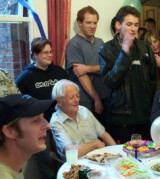Contact Us in the UK
- Phone: 01302 811319
- Email:
- Mailing Address: 24 Elmfield Road, Hyde Park, Doncaster, South Yorkshire DN1 2BA
Contact Us in the US
- Phone: 202.468.4571
- Email:
- Mailing Address: PO Box 5188 Wheaton, IL 60189-5188

 A UK church is discovering that being drawn to ministry among Kurds, and mission in general, is not the preserve of a few, but the privilege and responsibility of everyone in every church. Here, our contributor assesses some of the pitfalls of missionary biographies, and the need to reclaim a whole church vision for mission.
A UK church is discovering that being drawn to ministry among Kurds, and mission in general, is not the preserve of a few, but the privilege and responsibility of everyone in every church. Here, our contributor assesses some of the pitfalls of missionary biographies, and the need to reclaim a whole church vision for mission.
David Brainerd, Hudson Taylor, CT Studd and Jim Elliot quickly became heroes to me at university. In the early years of my Christian life I devoured their stories, gripped by their daring faith and their trust in a God that I was just starting to know, I found myself wanting to follow in their footsteps.
Yet despite their influence I have become increasingly nervous about recommending them. Why? Missionary biographies may well be useful for discipleship but they fail as a ‘missions’ textbook.
Stories capture our imaginations and whilst biographies may never intend to be a textbook they do teach the reader. Whether it was ever their intention or not missionary biographies communicate implicit messages about what Christians’ involvement in mission looks like. Brainerd and Taylor become our models for mission. The danger is not so much the specifics of these men’s lives or outlook but that the medium of biography places one individual at the centre of the story, albeit an individual under God’s good hand and direction. I have become persuaded of a model of mission which places the church at the heart of mission, not merely at a pragmatic level but at a theological level. What I am now looking for is a Church biography.
Our church’s continuing involvement in serving Kurds has begun to re-define my personal role in mission. Whilst I became convinced in principle through the scriptures, it was our circumstances which confirmed that it is the church together that should be doing mission and not just me.
As our mission field was local I was never in a situation where I made a career choice to become a missionary. As our mission field offered very real opportunities I didn’t need to look wistfully overseas for other challenges. As our mission field was among Kurds it became more obvious that those best placed to be the ‘missionary’ would be them and not me. As our mission field was among a people group who globally had only a few churches I realised it could not just be them it had to be us together in mission. God conspired to move me from an individualistic, romantic view of mission to a corporate, realistic view of mission.
One expression of this shift in my thinking is the statement that summarises our church’s commitment to reaching Kurds:
“We want to see a Kurdish church established in our city. A church led by Kurds, which is reaching Kurds both in our city, the UK, Europe and in Kurdistan. A church which partners with other churches worldwide to enable church planting amongst Kurds both here in our city and throughout the world. A church which also sees its responsibility to mission beyond that of reaching Kurds, in particular those nations and people groups which surround Kurdistan.”
In future blog entries you can read some examples of how this statement is worked out in practice for us as a Church. Let me dare to suggest that it will be a far more compelling read to hear of men and women, drawn from different contexts and cultures, serving together for the sake of mission. It will be far more convincing because if it is a story about the Church then it will be a story about Christ.
Comments
Login/Register to leave a comment